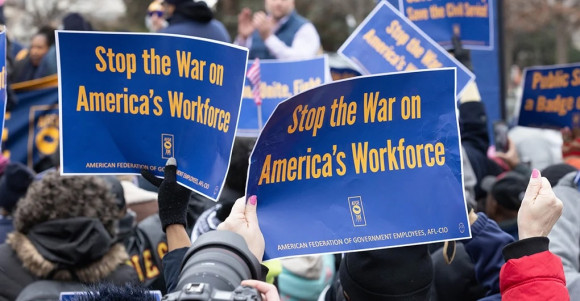Welcome to We Decide: America at the Crossroads with Jenna Flanagan.
As the federal government shutdown enters its first full week, the leader of the nation's largest federal union told Jenna Flanagan that for the many thousands of his members who have to continue working without pay, real economic hardship is just a missed paycheck away.
Dr. Everett C. Kelley, president of the American Federation of Government Employees, which represents over 800,000 federal workers, explained the real challenges for workers that have to keep working without pay while still covering the costs of commutation and childcare.
Compounding their hardship is President Trump's "unpredictable" behavior because "you don't know if this is going to last a month or two months or three months or one week—we just don't know," Kelley said. "I will say six days is too long. It's already been long enough. The Congress needs to open the government and make sure federal employees are back at work."
Kelley continued: "We talk about living from paycheck to paycheck. Sixty-five percent of America does that, and our members are no different... A person that is living from paycheck to paycheck can never be made whole really — that's the whole point. The mortgage is still going to come due on the same day, right? The bill for medications is going to come due regardless of whether or not you are working. If you want to stay healthy you have to pay your medical bills."
As the AFGE leader sees it, the shutdown follows nine months of unrelenting attacks on the federal civil service, starting with Elon Musk's Department of Government Efficiency layoffs and random demands for career employees to justify their jobs.
The Republican House Speaker Mike Johnson is apparently in no hurry to open the government, having recessed his chamber until Oct. 14.
We check in with our reporters’ roundtable — Washington, D.C.-based investigative reporter Dave Levinthal and New York City freelance journalist Laura Jedeed, who tracks the MAGA movement and the military — about the shutdown. We ask our panel about last week’s shocking use of Black Hawk helicopters and military assault-like tactics on a five-story Chicago apartment building by federal immigration forces as part of what's being called Operation Midway Blitz.
In our Pacifica Affiliates reporter's notebook, we get an update from KBOO on President Donald Trump’s attempt to call out Oregon National Guard troops to the city of Portland, which was put on pause by court order over the weekend. Can the states find ways to retain control over their guard units? This week Pacifica’s KBOO digs into the president’s attack on Portland for a deeper look at the rules of deployment and how they impact the guard members themselves.
In our C Block, we check in with Veronica Salama, senior staff attorney with the NYCLU, who is part of Mahmoud Khalil's legal team. Early on, the Trump administration sent immigration officers to arrest Mahmoud Khalil, who had graduated from a Columbia University master’s program. He was a green card holder who had also led protests against the Israeli military’s siege of Gaza. Khalil was taken first to New Jersey and then spirited off to Louisiana. His wife, who was present at his arrest, was nine months pregnant.
Ultimately, Khalil was released, but he’s still in the Trump administration’s crosshairs. Back in April, court filings confirmed federal immigration officers lied when they initially encountered Khalil and told him they had a warrant for his arrest.
